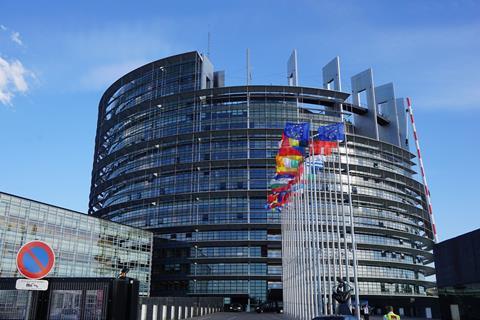
Organisations representing content creators across Europe have expressed dismay at the European Parliament’s rejection of a new EU copyright law aimed at updating existing legislation to fit the digital age.
European Parliament members voted 318 to 278 against the proposed rules, with 31 abstentions, at its Strasbourg seat on Thursday (July 5), in one of the final sessions ahead of the institution’s two-month summer recess.
The vote was preceded by an intense lobbying campaign pitting those who believe digital players are exploiting news and media content without properly remunerating the creators, against opponents of the proposed rules who said it posed a threat to a free and open internet.
Reaction
Thursday’s result sparked a raft of statements from creative industry organisations from across Europe decrying the rejection of the new directive and accusing the big digital players of orchestrating a disinformation campaign.
“The text proposed to the European Parliament on Thursday was balanced and guaranteed the fullest protection for content and its creators on the internet,” French directors guild L’ARP said in a statement.
“Unfortunately, a disinformation campaign, orchestrated notably by the big digital powers, has for the time being led to this text being rejected.”
“Today the digital platforms are distributors just like all the others and they make a profit from our work. They have a responsibility to assume a certain transparency and to pay creators properly. Let’s not forget, that without our work these platforms are nothing more than simple pipelines.”
These sentiments were echoed by French authors guild LaScam.
“LaScam, along with the whole creative industry throughout Europe, conveys its huge deception towards this missed occasion to support a historical step forward which promised to adapt the creative ecosystem to the digital era,” the body said.
“It deplores that a majority of MEPs has visibly decided to give in to propaganda campaigns led by the dominant digital players and their outstanding financial means (more than 30 million euros spent on lobbying) to prevent this text from reaching its objectives.
Across the Channel, Directors UK, representing some 6,000 professionals from across the UK film and TV industry, also expressed disappointment at the vote but said the fight would continue to secure proper remuneration for its members whose work is exploited online.
“It’s a setback, but not the end of the road,” commented Directors UK CEO Andrew Chowns.
“We will keep working with our colleagues in FERA and SAA and all the other creative organisations over the next few months to get our message across, he continued referring to the Federation of European Film Directors as well as the Society of Audiovisual Authors.
“Fair remuneration for Directors is absolutely vital and we will keep on working for it.”
The new directive was widely backed by content creators across Europe, including music stars such as Paul McCartney as well as filmmakers such as Jean-Luc and Pierre Dardenne and Cristian Mungiu, who all behind a campaign backing the reform.
Tech giants
High-profile opponents included Wikipedia founder Jimmy Wales, who described the directive as “disastrous”, and World Wide Web inventor Tim Berners-Lee, who said the new law would turn the internet into “a tool for surveillance and control”. A number of Wikipedia sites across Europe went offline in protest ahead of the vote.
At the heart of the criticisms of the new law were two articles: articles 11 and 13.
Article 11 was aimed at protecting the content of newspapers and other information sites from unpaid exploitation by platforms like Google and Facebook through the introduction of a “link tax”.
Article 13 put greater responsibility on websites to enforce copyright law around the content posted on their platforms by users. Opponents argued that only the big platforms had the resources to finance the filter systems required to police user content in this way.
Wales argued that the law would only “guarantee the continued dominance of the big platforms in Europe” rather than diminish their grip.
Following Thursday’s rejection of the vote, the European Parliament now has the summer to rework the proposals ahead of a fresh vote in September. The lobbying campaign is likely to remain fierce on both sides.

























No comments yet